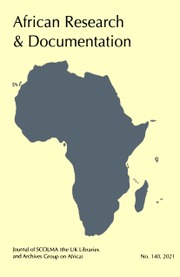No CrossRef data available.
Article contents
The Storage Place of Tradition: The Reading Experiences of Black Adults in African Languages
Published online by Cambridge University Press: 25 April 2022
Extract
As many others have pointed out, the profile of African language publishing in South Africa is highly distorted with almost all book production in this area being focused on the educational market (Maake, 1993; Machet, 1996). In addition, the stigmatisation of African languages through apartheid language policy has meant a low demand for leisure and general reading in African language material. English by contrast has come to be the language of status and the language in which many wish to read.
However, at the same time, the elevation of African languages to official status makes it necessary to develop a body of literature that will help in the growth of these languages. Given the de facto situation on the ground, the task is an overwhelming one, yet it is also crucial - both to overcome the linguistic inequities of the past and to expand the general publishing market in South Africa, currently dominated by the needs of a small white, middle-class, English urban sector.
- Type
- Reading and Readership in South Africa
- Information
- Copyright
- Copyright © International African Institute 2000


